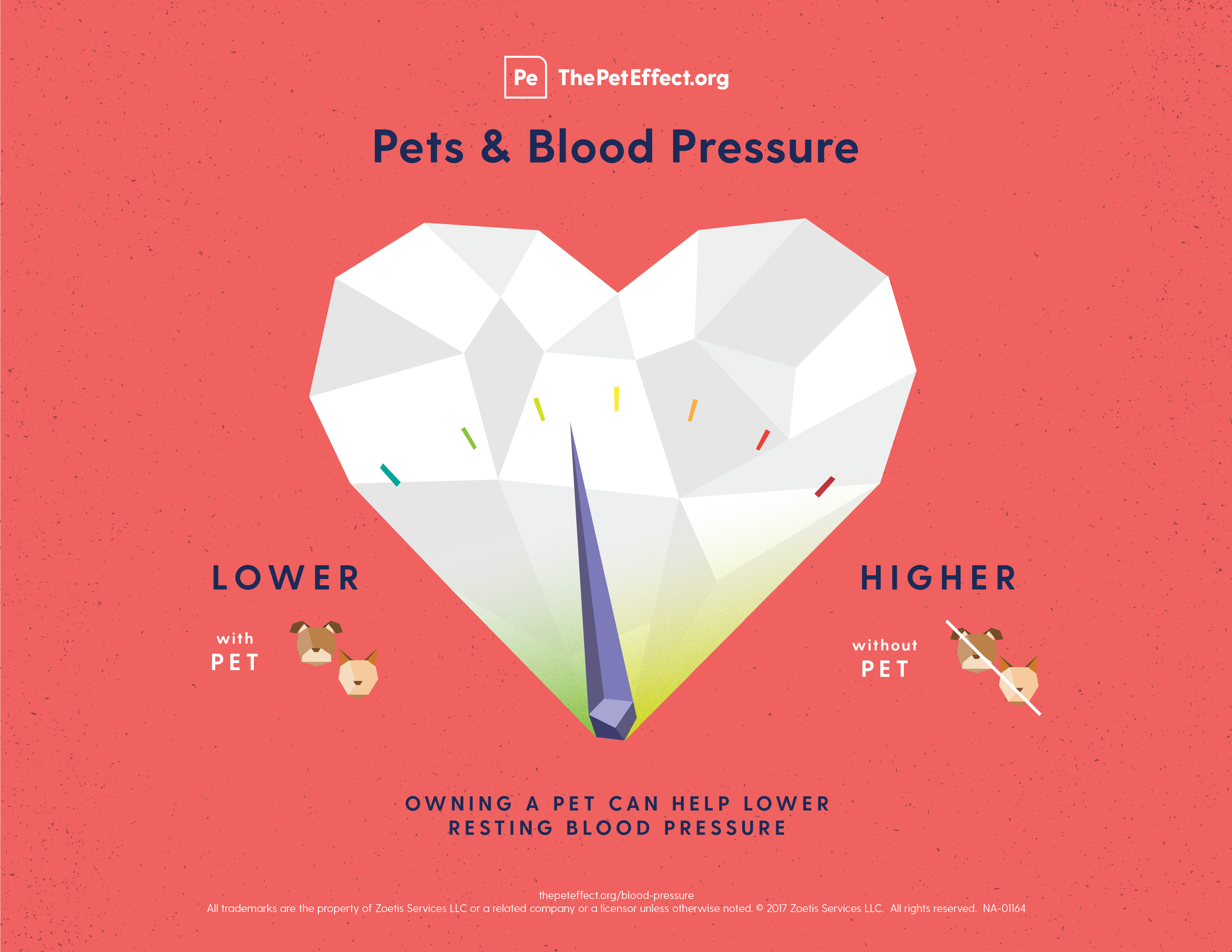A healthy heart is essential for good health at any age. Research suggests that pet ownership and human-animal interaction (HAI) can lead to improved heart health through supporting a healthy lifestyle, preventing heart disease, and facilitating healing following a cardiovascular event. Since February is Heart Health Month, we’ve compiled the top scientific evidence on how the human-animal bond supports goo heart health.
Stress Reduction
High stress can contribute to many health issues associated with cardiovascular disease (CVD). Stress is also associated with behaviors that increase heart disease, such as physical inactivity and overeating. The CDC recognizes that especially during the COVID-19 pandemic, stress can run high, and stress management is essential to living a healthy life.
Scientific research has supported the concept that people experience less stress in the presence of pets. To measure the impact of companion animals on stress levels, many studies incorporate a transient stressor, such as having study participants perform a challenging arithmetic problem. A study of 120 married couples demonstrated that, in the presence of a pet, people experienced less stress in response to a similarly designed arithmetic test[1]. Another study compared 45 adult female dog owners responses to stress after performing mental arithmetic tasks in laboratory and home settings. Results indicate that reactivity to these tasks was moderated by the presence of a pet[2].
Lower Blood Pressure & Cholesterol

High blood pressure and cholesterol are identified by the American Heart Association as high risk factors for CVD. These conditions increase the heart’s workload and are influenced by a variety of health behaviors such as smoking. Multiple studies have demonstrated that interaction with companion animals is associated with beneficial effects including lower blood pressure and cholesterol.
In one study of older adults with pre-to mild hypertension, dog ownership was associated with lower systolic and diastolic blood pressure. The researchers believe that dogs in this study had a direct effect on lowering diastolic blood pressure in their owners, and also indirectly lowered blood pressure by improving mood in their owners[3]. These findings suggest that pets, especially dogs, may be an effective intervention to reduce blood pressure during owners’ daily lives, in addition to usual care. Pet ownership may also slow the development or progression of high blood pressure in older adults.
The coronary arteries are the blood vessels that carry blood to the heart. When a person has coronary artery disease (CAD), their arteries are narrowed or blocked by a buildup of cholesterol and fatty deposits called plaques. A study of over 600 patients with CAD found pet ownership to be protective against this disease[4] as dog owners had a significantly lowered risk of CAD compared to non-owners, after adjusting for variables including age, gender, and family history of CAD. Moreover, decreased CAD risk was also found in people who owned pets from a young age.
Increased Physical Activity
Positive changes in physical activity are another way pets can influence their owners’ heart health. Less than 5 percent of adults participate in 30 minutes of physical activity each day, and only one in three meet the recommended weekly level of physical activity. Research has found that acquiring a dog leads people to walk more[5]. On average, dog owners walk one hour more per week compared to non-owners, according to a study that analyzed data from nearly 6,000 Michigan adults. This study also found that compared to non-owners, the odds of obtaining at least 150 minutes of walking per week were 34 percent higher for dog walkers, and the odds of doing any leisure time physical activity were 69 percent higher[6]. Dog walking has also been associated with a reduced incidence of obesity. An observational epidemiological study of almost 2,200 subjects found significantly fewer obese dog walkers compared to owners who did not walk their dogs and non-owners, respectively[7].
Dog owners report that their dogs provide strong motivation and social support which encourages them to walk more often[8]. Social support is a major contributing factor to maintaining behavioral change, including weight loss[9]. Researchers theorize that, in addition to dogs providing an increased opportunity to go on walks, the social support dogs provide can motivate people to maintain lasting changes in their routine and shed weight[10].
Improved Recovery
While prevention of disease through healthy behaviors is key to living a heart-healthy life, research has found a connection between pet ownership and improved cardiovascular reactivity, which may aid in the recovery following a cardiovascular event such as a heart attack or stroke. In a nationwide study of over 300,000 Swedish patients who suffered a stroke or heart attack, dog ownership was found to be associated with a lower risk of death following a heart attack compared with non-owners[11], with a similar reduced risk of death following a cardiovascular event observed in cat owners[12]. Researchers hypothesize that pets contribute to increased survival rates through providing affection and the relaxation of their dependable presence[13].
The stress-buffering power of pets also contributes to this enhanced recovery. A growing body of literature indicates that long periods of recovery following exposure to stress can act as a risk factor for health problems. People with pets have been found to recover more quickly from a stressful event compared to non-pet-owners[14], especially in the presence of their pets.
Pooling the data of over 3.8 million participants, a systematic review of studies found dog ownership was associated with a 24% risk reduction for all-cause mortality as compared to non-ownership. In analyses of studies evaluating cardiovascular mortality, dog ownership conferred a 31% risk reduction for cardiovascular death[15]. Physical activity related to dog walking may be a mediator of the association between dog ownership and health outcomes[16].
A decreased risk for death due to heart attack and all cardiovascular diseases (including stroke) has been observed among persons with current or past cat ownership. Cats provide owners with more opportunities to relax throughout the day, which may contribute to buffered heart health over time[17].
Help Raise Awareness
HABRI’s support for research into the health benefits of the human-animal bond is contributing to a greater understanding of the impacts of pets on heart health, stress and risk of disease.
To help raise awareness during Heat Health Month, HABRI created a new, sharable infographic on the powerful relationship between pet ownership and heart health. Please download it here and help spread the word!
To stay informed on the latest from HABRI, including updates on the latest news relating to the Human-Animal Bond, recently published studies, and the publication of HABRI-funded research, please sign up for the HABRI Newsletter or follow us on Facebook, Twitter, Instagram or LinkedIn.
References
10.
17.





